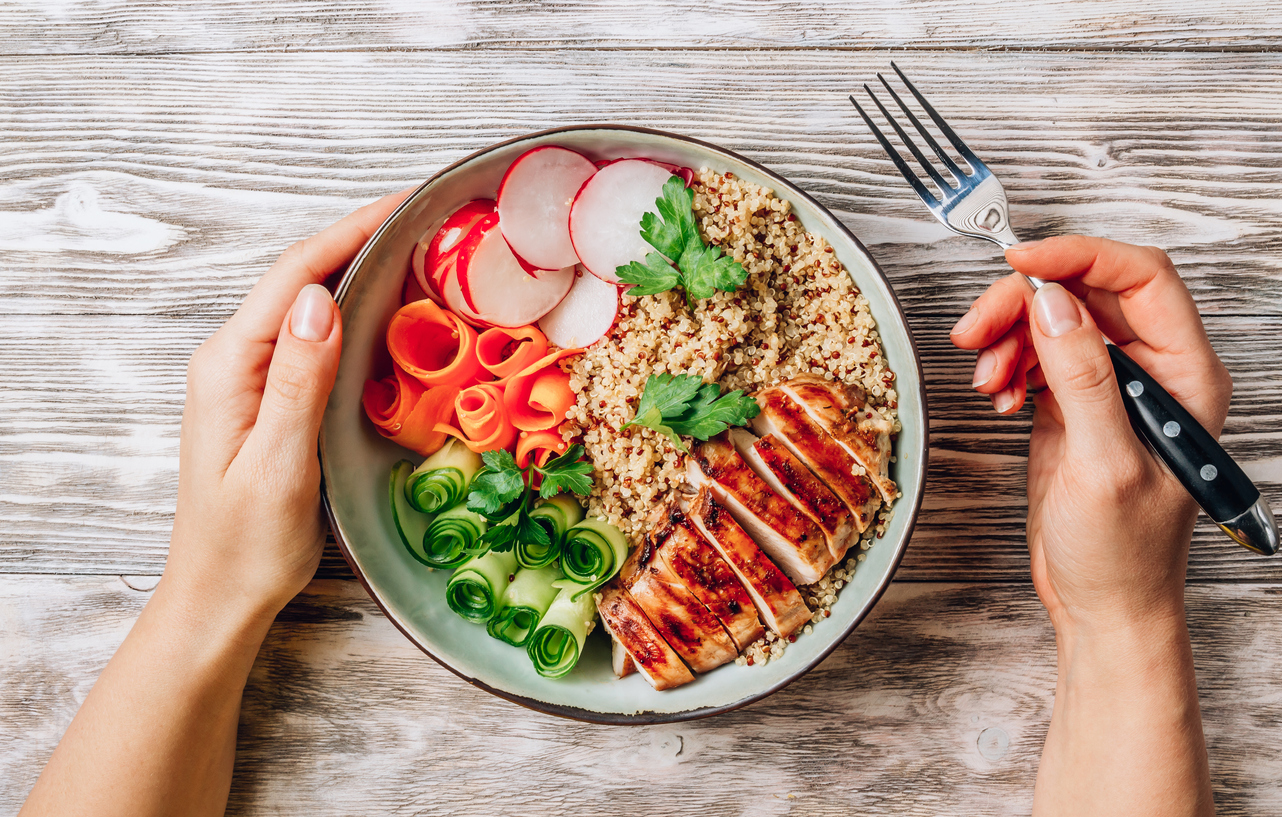We depend on protein, fats, and carbohydrates to meet our daily nutritional needs. We need a certain amount of essential amino acids per day from protein as well as essential fatty acids from fats to carry out certain functions. But what about carbohydrates? Aren’t they also “essential”? Indeed, carbs play an important role in metabolism and energy production. But not all carbs are created equal, and, when consumed in excess amounts and not burned off later for fuel, can be problematic for some individuals.
Our bodies rely on two primary sources of energy: fats and carbohydrates. Similar to how your car runs on gas for fuel, so too do our bodies rely on fats and glucose to perform daily activities. For example, when it comes to exercise, fat is a better fuel source for low to moderate-paced activities like walking, running, jogging, and swimming. Carbs (glucose) are ideal for high-performance athletes or those that do CrossFit, HITT, lift weights, and hit the gym regularly.
Our ancestors also relied on certain carbs for a quick energy boost especially in times of hunting and defense– mainly starchy tubers and fruits. But what about the time we’re living in now? Sure, as humans, we’ve always been consuming carbs to some degree, but are we eating them at the same rate or as healthily as we once did? I’d say not exactly. Because of their high palatability, convenience, and addictive nature, carbohydrates are the one macronutrient to pay special attention to, especially given the unlimited processed foods available to us and our sedentary lifestyles.
Here are 10 tips for consuming carbohydrates with confidence in a carb-overloaded world:
(1) Determine carb intake by determining health status & physical activity.
You will need enough fuel to compensate if you exert a lot of energy. Likewise, if you have a certain health condition or you are pregnant or breastfeeding, your carb intake may be greater too. On the flip side, if you have blood sugar issues or you are insulin resistant AND you don’t move as often, your carbohydrate needs may be lower.
(2) Determine how your carb intake fits into your daily caloric needs.
A 200-pound athlete is going to have very different calorie/carb requirements than a 200-pound student sitting down in class all day. First, figure out how many calories you need based on your height, weight, age, and goals. Then, determine how many carbs are baked into those total daily calories based on your activity level and health status.
(3) Track your carb intake over time.
Apps like Meal Logger or Eat This Much are great ways to track your carb intake over time to see where your baseline is and determine how you’d like to adjust based on your lifestyle and goals.
(4) Pair your carbs with protein and fat.
Consuming carbs in isolation have a much higher effect on glucose and insulin than if you were to pair them with another macronutrient. Always aim to eat your carbs with protein and fat. For example, you could eat a piece of toast with avocado, oatmeal with coconut cream/almond butter, or a sweet potato with grass-fed butter.
(5) Eat your carbs last & your protein and fats first.
Just like how pairing your carbs with some protein and fat makes a huge difference in glucose and insulin, so does eating your carbs last. For example, you may be eating chicken, rice, and salad for dinner. Try to eat the chicken first, the salad second, and the rice third.
(6) Try pushing most of your carbs to later in the day.
If you know you won’t be exerting a lot of energy throughout the day, try consuming the greater portion of your carbs later in the day (a.k.a carb-backloading). Not only does this set you up for experiencing fewer carb cravings throughout the day (by replacing them with high protein/fat meals/lower carb meals) but you’ll also savor and appreciate them a lot more when you finally do get to eat them. Hopefully, you’ll eat the right ones too!
(7) Consume more carbs during your busiest days of the week.
Just like carb-backloading, you may decide to eat a majority of your carbs on the days you know you’ll be the busiest and the most active. This will give your metabolism a break, re-sensitize your insulin and give you something to look forward to, especially if are trying to control your carb intake.
(8) Eat cooked and cooled carbs.
Cooking, cooling for up to 1 hour, and then reheating carbs (specifically starchy ones) has a lower effect on glucose and insulin levels than if we were to eat the carbs hot. This is because as starchy carbs begin to cool, they produce resistant starch which cannot be digested by the body and therefore won’t into much glucose. Less glucose = less insulin needed. Cooling your carbs for up 24 hours can produce even greater results.
(9) Eat whole & complex carbs.
We all know processed and refined foods are not ideal. Even though we can’t control what’s put onto the grocery store shelves, we can do our best to limit their consumption and choose healthier carbs that are friendlier to our insulin. Choose whole, non processed and complex carbs like nonstarchy and starchy vegetables, whole fruits, some grains (if tolerated), and nuts and seeds as the bulk of your carb intake.
(10) Try a little apple cider vinegar before your meals.
Apple cider vinegar helps our muscles process glucose more efficiently. Research suggests that taking 1 TBSP of diluted apple cider vinegar before your meals can control insulin levels during that meal. Adding vinegar to things like salads is also helpful. If you can’t take it before or during a meal, taking it after is fine too.
In general, carbohydrates are necessary for many reasons and generally shouldn’t be a concern for most people as long as they are eating the right types of carbs, monitoring their intake, and consuming them in the most helpful way possible based on some of the tips I mentioned above. P.S – big shout out to Health Coach Kait whom I give full credit for tips #4, 5, 8 & 10 from her recent video!
Written by Health Coach Lydia, NBC-HWC





